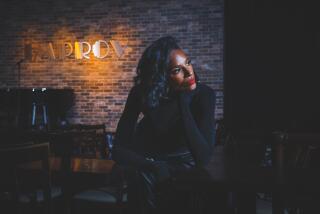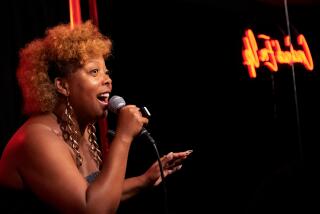CO-HOST CRABLE ENVISIONS BRANCHING OUT : OPTIMISM FOR ‘EBONY/JET SHOWCASE’
- Share via
The list of guests who have appeared on “Ebony/Jet Showcase” reads like a veritable Who’s Who of black performers.
From musicians (Ray Charles) to actors (Cicely Tyson) to comedians (Richard Pryor, Bill Cosby) to athletes (Magic Johnson, Walter Payton), most of the personalities featured on the syndicated show (which airs here on Sundays at 11 p.m. on KHJ-TV Channel 9) are recognized talents.
The others are lesser known but have interesting stories to tell, such as Peg Leg Bates, who lost his leg and some fingers in a cotton gin accident but went on to become a dancer; Dr. Edith Urby Jones, the first black woman to graduate from the University of Arkansas medical school, and Mother’s Band, in which a grandmother plays electric guitar.
Grouped together, they all have at least one thing in common: They’re black Americans who have achieved success, whether it be in a film, on the playing field or in their personal lives.
“One of the goals of the show is to provide inspiration and motivation by displaying the positive sides we find in our various communities,” said co-host Deborah Crable, who was in Los Angeles recently as part of a cross-country, month-long promotional jaunt for the show.
But to think of “Ebony/Jet Showcase” as only a series about and for blacks would be misleading, she maintained.
“We’re a family entertainment show that does target the black audience, but we’re finding a broader-based appeal,” Crable said.
As the audience becomes more diversified, with various ethnicities tuning in, Crable said that she sees the show branching out. “I mean, as a black person, I enjoy white artists as well as black artists,” she said.
So if whites or celebrities of other ethnic backgrounds are making news that is of interest to the black community, they could end up as guests on “Ebony/Jet Showcase” next season, its fourth, said Lydia Davis, vice president of promotion for Johnson Publishing Co.
Airing on 79 stations across the country, the half-hour syndicated show began in 1983 as “Ebony/Jet Celebrity Showcase,” the brainchild of John Johnson, president and publisher of the Chicago-based Johnson Publishing Co. It was designed to bring to life the pages of the company’s Ebony and Jet magazines, which have documented the lives of black Americans for more than 40 years.
Besides its involvement in journalism and television, the company also owns three radio stations (WJPC and WLNR in Chicago and WLOU in Louisville) and a cosmetics company, Fashion Fair. In 1986, Johnson Publishing grossed approximately $173 million in sales, Davis said.
Headquartered in Chicago, where in-house archives provide ideas and background resources, the magazine show hits the road to do its filming. “We always go where the story is, whether it be a cowboy range or Diahann Carroll’s living room--kind of like ‘Entertainment Tonight,’ ” Crable said.
The farthest the show has traveled has been London, and Crable hopes to make it to Jamaica soon for its annual Reggae Sunsplash Festival.
Crable joined the show in 1985 as it emerged from a one-year hiatus with a shortened title. Her co-host is Greg Gumbel, a former co-anchor on ESPN’s “Sportscenter.”
She had been working at WHMM-TV in Washington, D.C., when she met Johnson. “I interviewed him for a consumer affairs show I hosted and the rest, as they say, is history,” she recalled.
Though the new season may bring a broader selection of guests and a few more shows devoted to a single performer, the basic format will remain packing four interviews into each 30-minute program.
“We always try to keep them asking for more,” Crable said.
The show’s audience remains small by TV standards. At KHJ-TV Channel 9, researchers say “Ebony/Jet Showcase” averaged a 1.1 rating during May--about 50,000 households--and add that that wasn’t bad, considering its late-night slot.
But Crable said the national figures are growing and she is optimistic about the future of shows that target a narrower audience than television traditionally has.
“For the first time, we’re making progress,” she said. “Attitudes are shifting. The minority isn’t being looked at as an oddity. People are starting to listen.”
More to Read
The biggest entertainment stories
Get our big stories about Hollywood, film, television, music, arts, culture and more right in your inbox as soon as they publish.
You may occasionally receive promotional content from the Los Angeles Times.










